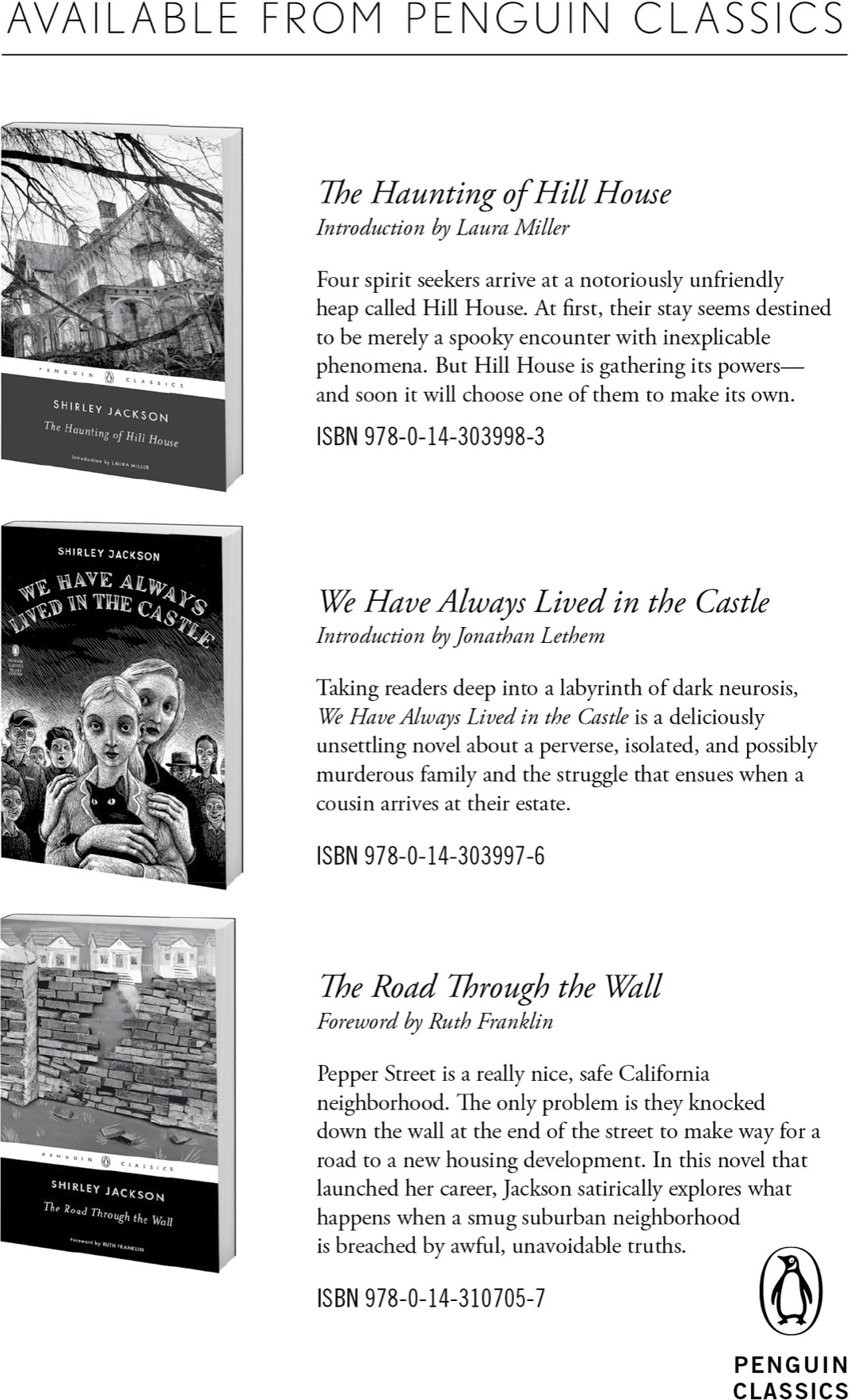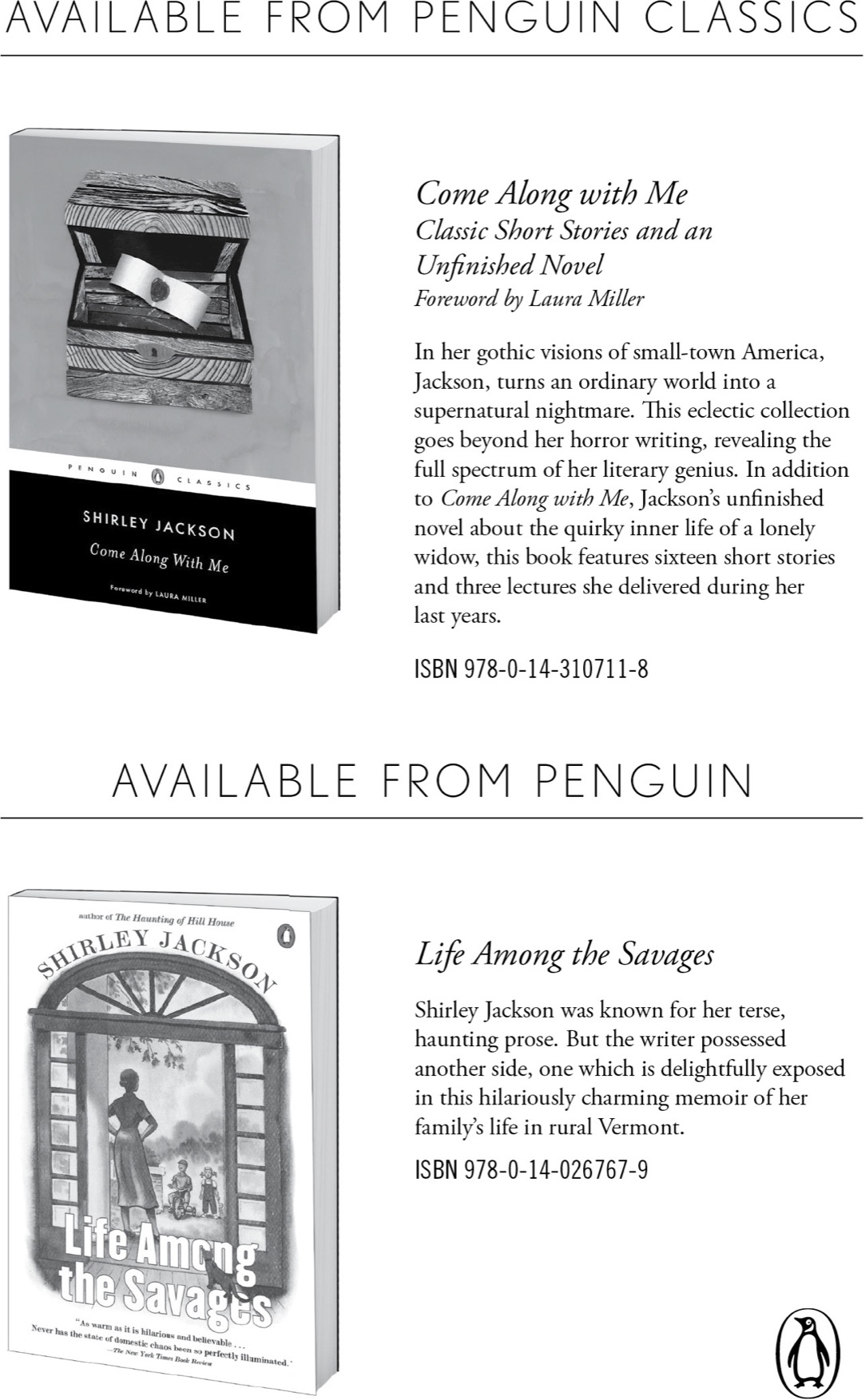Hangsaman (32 page)

It
is
my mother, Natalie thought, come to take me home. “I'm lost, I think,” she said.
“Well, get in,” said the woman. She leaned in her seat to open the back door of the car and Natalie obediently climbed in; it was an old car, and the back seat was crowded and cramped with accumulated junk; there were bottles there, she could hear from the rattling, and old papers, and a kind of blanket that felt like the horrible hair of some animal. The car moved as Natalie leaned back and the woman turned halfway around to stare at Natalie. The driver of the car, of whom Natalie could see only a neck and the back of a hat, leaned forward to peer at the road, as though able to see farther with his own eyes than the headlights showed. “Well,” said the woman, looking at Natalie in the dark, “
you
were certainly far away from everywhere.”
“I was lost,” Natalie said.
“Long walk back to town,” the driver said.
“You were very kind to pick me up,” Natalie said.
“We
always
pick up people,” the woman said comfortingly. “Can't stand seeing anyone walk so long's we have a car ourselves. And lucky for
you
.”
“It certainly was,” Natalie said.
“Where you from?”
“The college.”
The woman nodded against the reflected light of the headlights. “College,” she confirmed, not at all surprised.
“This is certainly nice of you,” Natalie said.
“How old are you? Eighteen?”
“Seventeen.”
“
Our
girl's eighteen,” the woman said, pointing out some irremediable fault in Natalie. “Goes to business school.”
“Stays out of the woods,” the man added.
“Well, now, you don't ever know,” the woman said consideringly. She turned and looked at him and then back at Natalie. “I guess Moms and Dads never
do
know what the kids are doing, really,” she said.
“I guess not,” Natalie said.
“I guess
your
Mom would be pretty mad if she saw you walking down that lonely road alone.”
“I guess so.”
“Can't ever tell what'll happen to a girl alone along there,” the man added.
“Attackers,” the woman said, and nodded. Beyond her nodding head the first lights of the town showed suddenly. “
Terrible
things,” she said in a low voice to Natalie, as one communicating female facts not suitable for the ears of men. “Attackers and all that.”
“Where she want to go?” the man asked the woman.
“Back to college?” the woman asked Natalie.
“Extra two miles,” the man said.
“The center of town will be fine,” Natalie said hastily. “After all, you've saved me a mighty long walk.”
“More'n
that
,” said the woman, nodding again. “Down that lonely road.”
“Tell you,” the man said, compromising, “we'll take her as far's the bridge. How's that?”
“That will be wonderful,” Natalie said, “I can get back to the college from there in five minutes.”
“All lighted streets, too,” said the woman with satisfaction. They all watched with silent pleasure as the town took shape around them, filling out its streets with stores, with hotels, with lights. They went down the main street and Natalie saw without surprise that the lampposts were trimmed with wreaths and that strings of lights had been festooned overhead in preparation for Christmas; the yellow and blue and red of neon signs blinked crazily into the car as they went on down the main street to the bridge.
The man brought his car to a slow and accurate stop in the center of the bridge, and the woman reached around to open the door for Natalie. “There, now,” she said.
Getting out, Natalie told them both, “Thank you very much,
very
much. I can't tell you how grateful I am.”
“Nothing at all,” said the woman, and the man said, “All right.”
“Thank you again,” Natalie said, and closed the door. She waved after them as the man made a cautious, formal turn in the middle of the bridge, and waved again as they went back off the way they had come. Then, somehow puzzled by her quick transition from a lonely wet road to the middle of a lighted bridge, she crossed the sidewalk to the bridge parapet and stood looking down, to make sure where she was, but she saw instead the water below, with the raindrops falling into it.
Why shouldn't Iâ? she thought with irresistible logic and leaned over farther, and even farther; she put one shoe against the stone to urge herself higher and thought with glory, Mother won't care if I scuff it now; it will be lost before it wears out.
“Going swimming?”
Natalie came down quickly from the wall, feeling to make sure that her skirt was down properly, turning to see who had spoken to her at this irrecoverable moment; it was no more than a figure disappearing into the rain, and turning a wet grinning face back at her over its shoulder; for a second she thought that it might easily be the one-armed man from the restaurant.
More people were nearby on the bridge, but she was not embarrassed to turn away from the parapet and walk quietly toward the college; it occurred to her that unless she actually jumped over the parapet into the river she was of small interest to them. As she passed, she looked into their faces, and they were laughing or talking or walking quietly along, and none of them did more than slide a look past Natalie who was walking quietly along without interest.
The reassuring bulk of the college buildings showed ahead of her, and she looked fondly up at them and smiled. As she had never been before, she was now alone, and grown-up, and powerful, and not at all afraid.




*
Here I perceive imperfectly my own meaning, and apologize if you understand, but if you do not, Iâbeing this morning more soberâcharge you to keep it in mind until you do. Do you get any other letters with footnotes?

